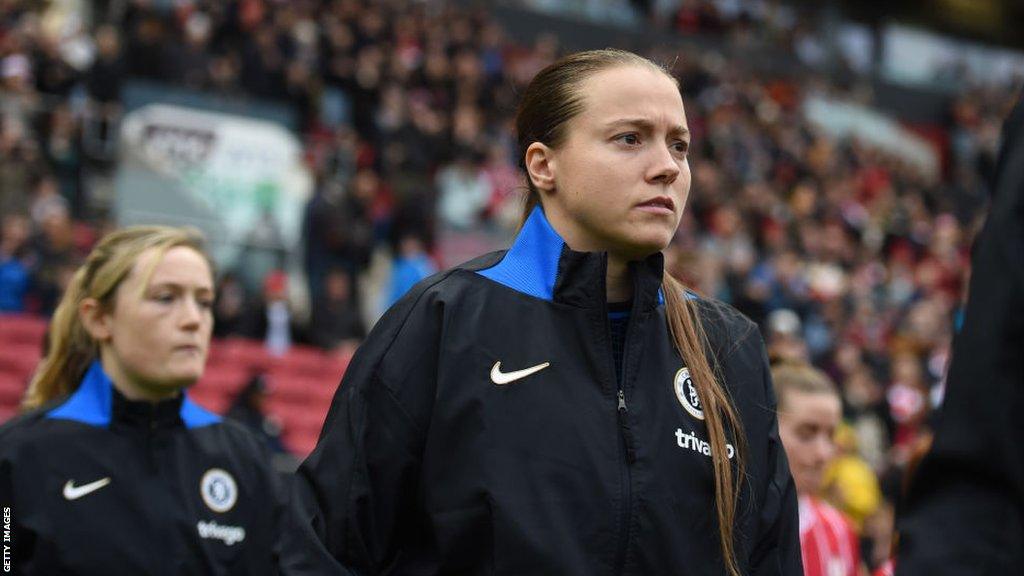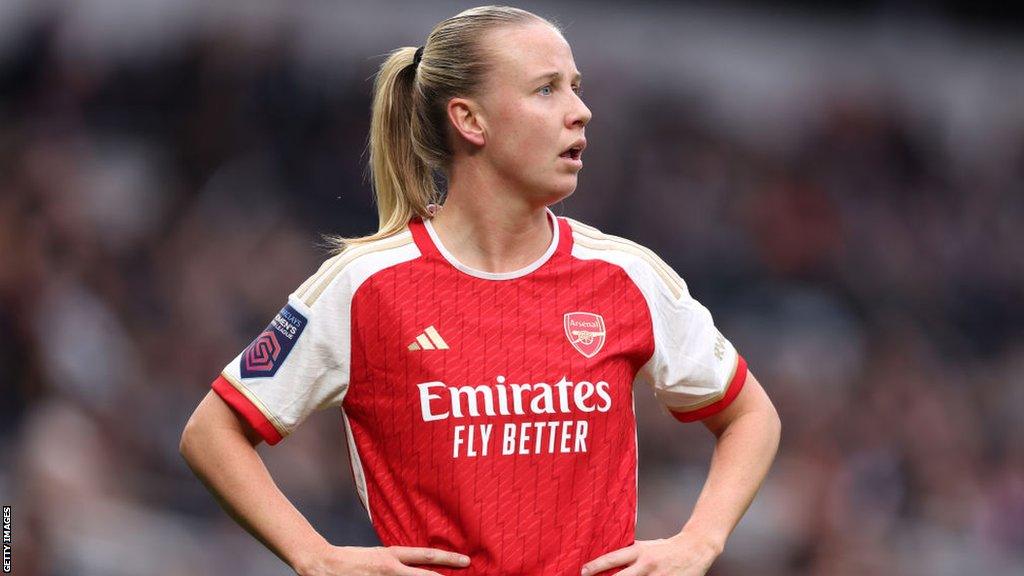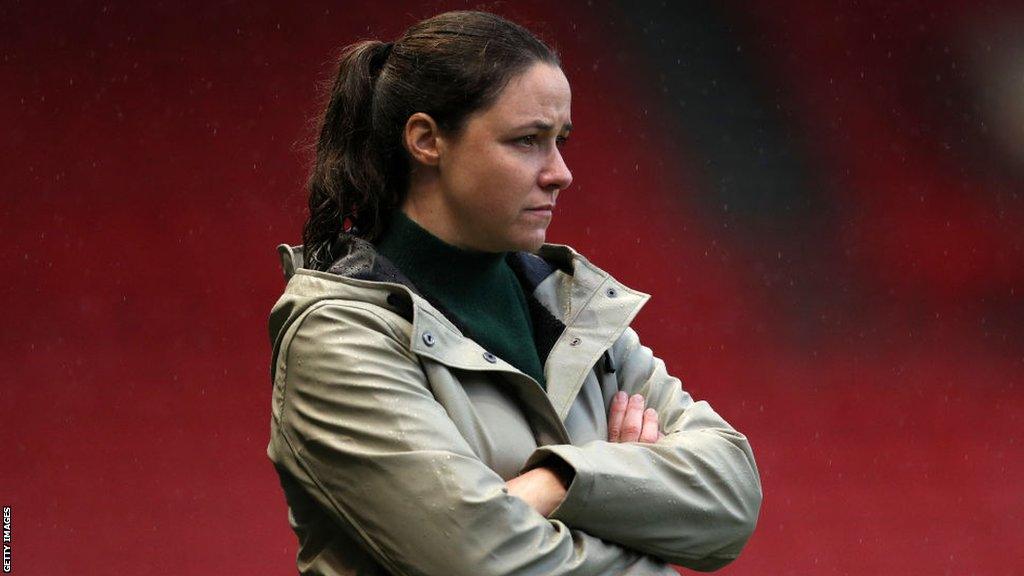Women's Super League: Are clubs doing enough to support mental health?
- Published

England international Fran Kirby is among those to speak out about issues affecting players in the WSL
Domestic women's football is on the rise in England - but is enough being done to protect the mental health of players?
The growth of the Women's Super League has thrust them into the limelight, bringing more pressure and expectation from media, fans and stakeholders.
Arsenal's WSL victory over Chelsea at Emirates Stadium last month was watched by a record crowd of 59,042, while an audience of 21.2 million watched the BBC's television coverage of the Women's World Cup in July and August.
But as visibility and popularity grows, are the necessary resources increasing at the same rate at WSL clubs?
The mother of Championship footballer Maddy Cusack, who died in September at the age of 27, told BBC Breakfast the pressures faced by female footballers are "way too much". Last month, an external investigation into the events leading up to her death found no evidence of wrongdoing at Sheffield United, the club said.
Issues were also raised about player welfare in Karen Carney's government review on women's football in July.
Maheta Molango - the chief executive officer of the Professional Footballers' Association (PFA) - told BBC Sport: "It's vital that player welfare is at the heart of the women's game.
"The way the game treats those who play it should be a leading factor in how we judge its success. It's important that everyone keeps that front of mind at a time of significant growth and reform."
What issues have been raised?
'A lot of people see athletes as robots' - Kirby on body image and abuse
Chelsea midfielder Fran Kirby said recently there was a "stigma" around nutrition in women's football, adding there was more pressure on players regarding "their weight and how they look on TV".
In an interview with BBC Sport, she said she had received comments on social media and worried about the impact that could have on younger players.
Other high-profile players - including Kirby's England team-mates Beth Mead and Mary Earps - have spoken out after being dropped by their national teams.
Players suffering from anterior cruciate ligament (ACL) injuries, including England's Chloe Kelly, have discussed the mental strain of recovery, and Everton striker Nicoline Sorensen retired in December after admitting she had lost enjoyment for the game.
In November, reacting to a statement by Cusack's mother, Aston Villa assistant manager Leanne Hall said the game was "broken" and said "many players and staff [are] struggling with no help or voice".
Asked whether more could be done to support players, Villa boss Carla Ward told BBC Sport in December: "I don't think enough is done. I believe licences within the WSL should have a requirement for clubs to have psychology and mental health support.
"The game is growing, audiences are bigger and these players are under massive spotlights - as are managers. I think there needs to be a wider support network for staff and players in the women's game.
"We have a long way to go in that. This is something I feel really, really strongly about. It needs a lot of focus and it needs highlighting."
The Football Association told BBC Sport there were plans to make club-specialist roles in wellbeing and sport psychology mandatory in WSL licences in the future.
It is, however, part of WSL regulations for all clubs to form a mental health strategy and to employ a full-time Safeguarding and Player Welfare Officer.
What resources are available?

Beth Mead's mum died shortly after the England forward suffered a serious knee injury at the end of 2022
BBC Sport contacted all 12 clubs in the WSL and four responded, providing information on some of their resources.
One club has a specialised unit for mental health within the medical department, while two employ performance psychologists - one part-time, the other full-time.
All four clubs have several staff members trained in mental health support, including at least one head coach. Some are trained annually, while others have regular training, including workshops on psychological phenomena - for example, post-tournament depression.
One club regularly screens players for mental health difficulties and collects wellness data, while another's staff members discuss individual player needs at least every two weeks.
All players within the WSL can receive help from Sporting Chance, a charity that works alongside the PFA and FA offering mental health and wellbeing support via a 24/7 helpline. This was used by Sheffield United players following Cusack's death.
On top of clubs' individual resources, the FA and PFA provide workshops to train staff, raise awareness among players and discuss action routes for those requesting specialist care.
All PFA members have access to counselling services, emergency support and personalised care. This is available to every WSL player but only 50% of those in the Women's Championship, who retain access as former WSL players.
The League Managers' Association (LMA) provides support for coaches and staff. Villa boss Ward said she received guidance from the LMA when she came under pressure at the start of the season.
The FA provides a workforce grant, which gives funding towards employing staff members in player care, wellbeing and psychology roles. It is at the discretion of clubs how they wish to use it.
Two free staff places on an Athlete Personal Development and Lifestyle course - which covers mental health - are also offered to clubs by the FA, while staff are invited to sit on a Mental Health Football forum (alongside 11 other organisations).
What other issues need addressing?
The PFA supports the Carney review's plea to provide more funding for professional players' representation.
"The review produced some excellent recommendations regarding the standards of care and support available to players, and the responsibilities the game - and clubs as their employers - have towards them," Molango said.
"It also recommended full funding of independent union support for players in the women's game, something which would allow us to expand the services and support we offer, both within the WSL and to players in the Championship.
"We obviously want to see those recommendations taken forward as a priority."
At the moment, the PFA does not have the funding to extend its membership to represent Women's Championship or men's National League sides, despite some being professional clubs.
There are instances when the PFA has stepped in following FA referrals on non-member players, and during exceptional circumstances, for example when Coventry United - now called Rugby Borough - were faced with voluntary liquidations.
The review and the PFA also emphasised the responsibility on clubs, as employers, to provide specialist, full-time staff.
While the FA provides help - for example via the workforce grant - it is down to the clubs to decide where to use that money.
BBC Sport understands the PFA conducts confidential surveys which have led to hundreds of referrals to Sporting Chance after a range of issues were raised by WSL players including insecurity of contracts, treatment by club staff and poor infrastructure.
On one occasion the Birmingham City squad sent a letter to the club's board, which was seen by the BBC, complaining about conditions for the women's team.
Several sources have also told BBC Sport clubs often use resources for their men's teams, rather than wanting to employ full-time specialists with experience working with female athletes.
It is also believed not all WSL clubs employ mental health psychologists.
What have WSL managers said?

Bristol City head coach Lauren Smith worked with the club in the Women's Championship before guiding them to the WSL
Leicester City manager Willie Kirk, who has worked in the WSL with Everton and Bristol City, believes there have been "huge steps forward" in mental health support in recent years.
However, Kirk admits the pressures on players have increased and support must continue to grow.
"There is more and more pressure on the players in terms of the amount of hours we want them [to work], the outside world looking in on them, the media coverage, the commercial pressures," added Kirk. "They're being pulled from pillar to post.
"There is a lot more placed on players and that means there must be a lot more support wrapped around them. Speaking on behalf of Leicester, we do that every well.
"We monitor not just their performance on the pitch, but how they're living off it in terms of their sleep, their menstrual cycle, their mood and their eating habits. We put as much care around the players as possible."
Arsenal boss Jonas Eidevall, who joined the WSL club in 2021, said it was "very much down to individual clubs" to address mental health support.
"We put just as much emphasis on that as any other part in the game," added Eidevall. "I think we have good resources, we have clear pathways, and a good understanding of how to deal with that. At Arsenal we prioritise it."
Manchester United manager Marc Skinner, meanwhile, said clubs need to "keep exploring" ways to care for players in an ever-changing environment in which players need "a spectrum of support".
Bristol City head coach Lauren Smith, who managed the team in the second tier before achieving promotion, said the club were also "very much tuned in" with mental health support, regardless of what representation was available to players.
"It's absolutely at the forefront of what we do and have been doing for years and still will be - it's very important," added Smith.